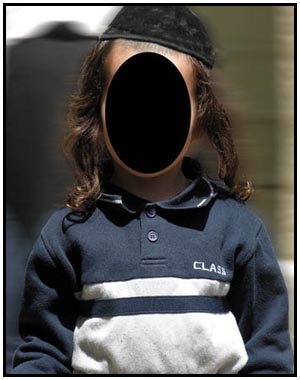 What would you say if this 10 year-old boy told you “[bad] things happen to you because you don’t wear a kipa (a.k.a. yarmulke or skullcap) and eat kosher food”? That’s what happened to me.
What would you say if this 10 year-old boy told you “[bad] things happen to you because you don’t wear a kipa (a.k.a. yarmulke or skullcap) and eat kosher food”? That’s what happened to me.I had occasion to be at his school and he befriended me while I was waiting for his principal. His school is a private, religious, elementary school with an enrollment of about 80.
To say that I was the odd man out would be a dramatic understatement. Although I made a special effort to dress in long pants and a hat before going there, I was clearly the outsider, with no chance of ever fitting in. However, he was friendly and conversational. The other kids mostly stared at me, much like I do a strange fish featured on the National Geographic Channel.
He told me that his class had just finished studying the book of Joshua, so I asked him to give me the short story version of Joshua. He started regaling me with a Midrashic story of Joshua beating up three thieves. He enjoyed doing karate chops and shadow punches as he mimicked Joshua’s clear and overwhelming victory over the bad guys. I enjoyed seeing his excitement, though I was disappointed that he didn't include anything about Joshua from the Bible in his summary.
During our conversation, it was clear that, in spite of his willingness to engage me in conversation, he, like the rest of his classmates, viewed me as an outsider, too. I didn’t look like him, therefore, it was obvious that I didn’t eat like him either. His comments revealed that the two criteria he used to determine my standing before HaShem (God) were my dress (especially the type of head covering) and my food.
He was surprised to find out that we actually buy kosher food. (It’s not so hard in Israel. In fact, it is more difficult to buy non-kosher food here.) However, it only took him one more question to reveal that we don’t “really” buy kosher food: we don’t buy food authorized as kosher by his particular group. “If it isn’t [a particular kosher stamp], it is not really kosher. They just trick people like you with all the other kosher stamps,” he said with complete assurance.
Though the hat I had chosen to wear allows me entrance to the Western Wall in Jerusalem, it wasn’t an approved head cover in his world. After all, it wasn’t a black kipa like he wears. However, there is still hope for me: If I stop eating non-kosher food and wear a black kipa, bad things will stop happening to me.
While I wouldn’t expect a ten year-old to see the irony of this conversation, I didn’t miss it. When I asked him how many brothers and sisters he has, he said, “I have three sisters, but I only say two because the youngest [an infant] is about to go to heaven.” (I found out later that his youngest sister has a serious heart problem and he has 4 brothers.) The problems I was there to speak with the principal about weren’t even on the “problem scale” compared to the death of an infant.
It never occurred to him that the proper head cover and kosher stamp hadn’t prevented bad things from happening to his family. The only thing he could clearly see is that I was an outsider invading his world, which must be the reason for my problems.
Questions:
1. How would you respond to his conclusions? Would you challenge him or simply not accede to his position?
2. How would you offer him encouragement and hope regarding his sister’s health condition?
3. How would you share the gospel with him?
1 comment:
Q1 - My response (challenge or simply not accede): I'd probably say some statement that indirectly challenges him due to its truthfulness, like: "Whether or not bad things happen, it is right for us to do what pleases God."
Q2 - How to offer encouragement and hope: I'm open to suggestions here. Currently, I'd probably show concern and have compassion.
Q3 - How to share the Gospel: I'm sadly unsure in this conversation. I just assume these things come up in relationships with him & his family.
Suggestions?
Post a Comment